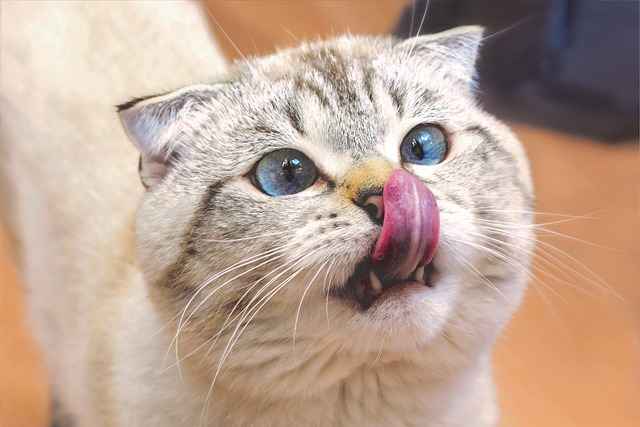The Scottish Fold Munchkin cat is a special and captivating crossbreed that has gained notoriety among cat partners. Known for its lovable combination of characteristics, the Munchkin breed acquired brief legs.
This breed stands out for its unmistakable appearance and perky identity. Whereas their charm is evident, the Scottish Overlap Munchkin cat also comes with particular care needs and moral contemplations that potential proprietors should consider.
Origins and History
The Scottish Fold Munchkin cat began in Scotland in the 1960s, when a usually happening hereditary transformation brought about in a cat with collapsed ears. People adore the Scottish Fold breed for its owl-like appearance.
On the other hand, the Munchkin breed is a generally more current breed that rose in the Joined Together States in the 1980s, characterized by its brief legs caused by a hereditary mutation. The Scottish Crease Munchkin crossbreed was created by breeders who needed to combine these two striking highlights into one breed.
Not all cat affiliations recognize the Scottish breed. In any case, the pet community has discussed moral concerns around breeding cats for extraordinary physical characteristics.
Physical Characteristics of Scottish Fold Munchkin Cat
The Scottish fold Munchkin cat is immediately recognizable due to its particular combination of brief legs and collapsed ears. These cats ordinarily have an adjusted confront, huge eyes, and a compact body, giving them a powerfully charming and stocky appearance.
Their coat can come in various surfaces and colors, extending from short-haired to long-haired assortments. Standard coat colors incorporate dark-striped cat, strong, bicolor, and more. In terms of the estimate, Scottish fold Munchkin cats are medium in size, with guys ordinarily weighing between 6-9 pounds and females weighing between 4-7 pounds. Their life expectancy is around 12 to 15 years, even though this can change depending on their well-being and care.
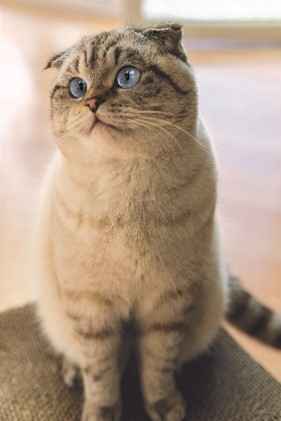
Temperament and Personality
Scottish fold Munchkin cats have a neighborly and warm nature. They tend to be social and appreciate spending time with their human companions. Although they are not as athletic as other breeds due to their brief legs, they are still perky and cherish engaging in intelligent exercises, whether chasing toys or investigating their environment.
Their insights make them possible, and they can learn fundamental commands and traps with legitimate positive gestures. They are often with children and other pets, making them an excellent choice for families. Like all cats, their personalities, and some of them may be more autonomous than others.
Care and Maintenance
Caring for a Scottish fold Munchkin cat includes consideration of their particular needs. Like all cats, they require an adjusted slim-down wealth in proteins and fats, but parcel control is critical to avoid corpulence, as their shorter legs make them less dynamic than other breeds.
Grooming needs will depend on their coat sort. Short-haired assortments require negligible prepping, whereas long-haired ones may require customary brushing to anticipate mats and tangles. Furthermore, ear care is pivotal due to collapsed ears, which can be inclined to diseases.
Customary cleaning of the ears and checking for any signs of inconvenience is essential. While they may be unable to hop as tall as other cats, Scottish Fold Munchkins still require customary work to keep them fit. Giving intelligent toys and empowering recess will offer assistance in keeping up their physical and mental well-being.
Well-being Issues in Fold Overlap Munchkin Cat
Like any crossbreed breed, the Scottish Overlap Munchkin cat can acquire well-being issues from its parent breeds. Both the Scottish Overlap and the Munchkin breeds may face particular hereditary conditions that potential proprietors ought to be mindful of:
1. Osteochondrodysplasia (Scottish Overlap Gene):
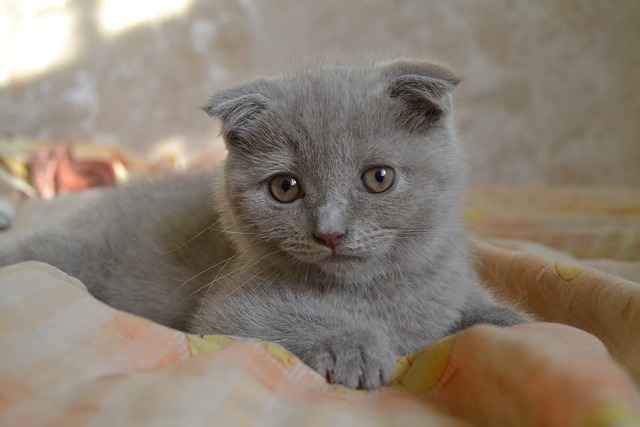
- What it is: A hereditary condition that influences the improvement of cartilage and bone, driving complex joint anomalies, solidness, and in extreme cases, devastating arthritis.
- Symptoms: Trouble moving, firmness, limping, or an abnormal stride. Cats may maintain a strategic distance from hopping or climbing.
- Management: Torment administration through pharmaceuticals, weight control to decrease push-on joints, and specialized care to guarantee mobility.
2. Lordosis (Munchkin Gene):
- What it is: A condition where the spine plunges unreasonably, causing compression of the organs in the chest. This is regularly seen in Munchkin cats due to their short-legged hereditary structure.
- Symptoms: Trouble breathing, laziness, and common shortcomings. In extreme cases, it can influence the cat’s quality of life.
- Management: No remedy for lordosis exists, but gentle cases can be overseen with checking and strong care. More extreme cases may require veterinary intervention.
3. Joint Issues and Arthritis:
- What it is: Due to their abbreviated appendages, Munchkin cats (and crossovers like the Scottish Fold Munchkin) can encounter joint issues early in life, driving to joint pain or other musculoskeletal problems.
- Symptoms: Trouble strolling, hesitance to hop, limping, or signs of torment when moving.
- Management: Normal vet checkups, maintaining a solid weight, and possibly giving supplements like glucosamine to bolster joint health.
4. Ear Diseases (Scottish Crease Gene):
- What it is: The collapsed ears of Scottish Fold cats are more inclined to wax buildup and diseases due to their structure. Ear contaminations can cause distress and hearing misfortune if cleared out untreated.
- Symptoms: Head shaking, scratching at the ears, odor, or release from the ear canal.
- Management: Customary ear cleaning, provoke veterinary care if disease is suspected, and check for any signs of discomfort.
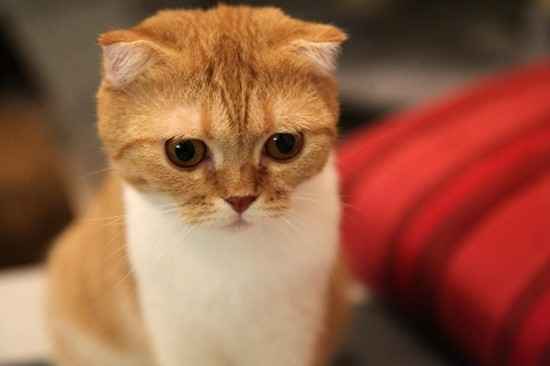
5. Obesity in Scottish Fold Munchkin Cat:
- What it is: Their brief legs make Scottish Overlap Munchkin cats less dynamic than other breeds, making them more vulnerable to weight gain.
- Symptoms: Fast weight pick up, trouble moving, and expanded lethargy.
- Management: An adjusted eat less, parcel control, and empowering standard play to keep the cat at a solid weight.
6. Spinal Deformities:
- What it is: Munchkin cats are at hazard of creating spinal deformations because of their abbreviated vertebrae. It can cause torment, versatility issues, or loss of motion in extraordinary cases.
- Symptoms: Curving of the back, trouble moving, or signs of torment when touched along the spine.
- Management: Munchkin cats require customary veterinary care, weight administration, and in serious cases, surgical mediation.
7. Patellar Luxation:
- What it is: This condition includes the disengagement of the kneecap, common in cats with shorter legs like the Munchkin. It can cause torment and weakness if left untreated.
- Symptoms: Weakness in the rear appendages, limping, or an abnormal gait.
- Management: Scottish fold Munchkin cat may require surgery in extreme cases, whereas the owner may oversee milder cases with physical treatment or anti-inflammatory medications.
8. Heart Disease:
- What it is: A few Scottish Overlap Munchkin cats may be at hazard of creating hypertrophic cardiomyopathy (HCM), a common heart condition that thickens the dividers of the heart.
- Symptoms: Laziness, trouble breathing, or blacking out. This condition is regularly analyzed through ultrasounds and heart monitoring.
- Management: Solutions to back heart work, regular vet visits, and observing for symptoms.
Preventative Care for Scottish Fold Munchkin Cat
- Regular Veterinary Checkups: Early detection of these wellness issues can improve the cat’s quality of life and offer assistance in managing conditions effectively.
- Proper Slim Down and Workout: Keeping a solid weight can reduce push-on joints and diminish the hazard of obesity-related problems.
- Reputable Breeders: Choosing a breeder who screens for hereditary issues can decrease the probability of genuine health problems.
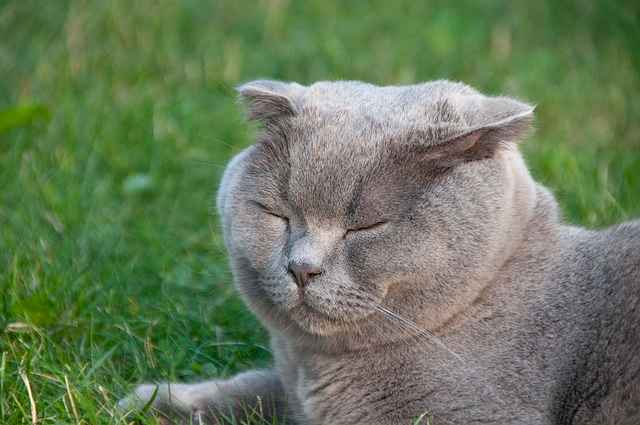
Exceptional Contemplations for the Breed
There are a few moral concerns regarding breeding a Scottish Fold Munchkin cat. The collapsed ears of the Scottish Crease and the brief legs of the Munchkin are caused by hereditary transformations that can lead to well-being issues.
For case, Scottish Folds are inclined to osteochondrodysplasia, a condition that influences cartilage and bone improvement, whereas Munchkin cats can encounter spinal and joint problems due to their abbreviated limbs.
Scottish Fold Munchkin cat, these potential well-being issues make it critical to procure a Scottish Fold Munchkin from trustworthy breeders who prioritize the well-being and well-being of their cats. Planned proprietors ought to be arranged for the plausibility of higher veterinary costs, as these cats may require more visit restorative attention.
Additionally, there is continuous talk about whether it is moral to breed cats with known well-being issues for appearance. Selection from covers is an incredible elective from breeders, as numerous cats, counting those with interesting highlights, are required for adoring homes.
Pros and Cons of Owning a Scottish Fold Munchkin Cat
| Pros: |
| • Unique appearance with collapsed ears and brief legs |
| • Affectionate and perky personality |
| • Generally great with children and other pets |
| • Compact estimate makes them appropriate for apartments |
| Cons: |
| • Prone to wellbeing issues such as joint issues and ear infections |
| • Requires careful consideration to preparing and ear cleaning |
| • May have higher veterinary costs |
| • Ethical concerns concerning the breeding process |
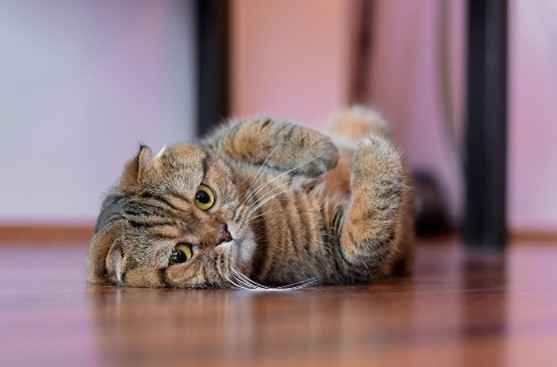
Conclusion
The Scottish Fold Munchkin cat is a delightful companion for those charmed by its unmistakable appearance and tender nature. Be that as it may, potential proprietors must carefully consider the well-being challenges and moral suggestions related to breeding this crossover.
With appropriate care and consideration, a Scottish Crease Munchkin cat can make an adoring and perky expansion to any domestic. Still, arranging for the obligation of owning such a particular breed is critical.
What is the life expectancy of a Scottish Crease Munchkin cat?
The normal life expectancy is 12 to 15 years, although this can shift depending on well-being and care.
Are Scottish Fold Munchkin cats great with children?
Yes, they are generally tender and get along well with children, making them a great choice for families.
How many workouts do they need?
Although their brief legs restrain their capacity to bounce, Scottish Overlap Munchkin cats are still perky and require customary workouts through intuitive play sessions.

